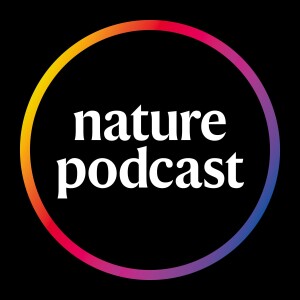
In this episode:
00:47 First observation of oxygen 28
Oxygen 28 is an isotope of oxygen with 20 neutrons and eight protons. This strange isotope has long been sought after by physicists, as its proposed unusual properties would allow them to put their theories of how atomic nuclei work to the test. Now, after decades of experiments physicists believe they have observed oxygen 28. The observations are at odds with theory predictions, so they imply that there’s a lot more physicists don’t know about the forces that hold atomic nuclei together.
Research article: Kondo et al.
News and Views: Heaviest oxygen isotope is found to be unbound
10:06 Research Highlights
How venus fly traps can protect themselves from wildfires, and a ball-point pen that can ‘write’ LEDs.
Research Highlight: Venus flytraps shut their traps when flames approach
Research Highlight: A rainbow of LEDs adorns objects at the stroke of a pen
12:39 An AI for Drone Racing
AIs have been beating humans at games for years, but in these cases the AI has always trained in exactly the same conditions in which it competes. In chess for example, the board can be simulated exactly. Now though, researchers have demonstrated an AI that can beat humans in a place where simulation can only take you so far, the real world. The Swift AI system is able to race drones against champion-level humans, and beat them most of the time. The researchers hope this research can help improve the efficiency of drones in general.
Research article: Kaufmann et al.
News and Views: Drone-racing champions outpaced by AI
Video: AI finally beats humans at a real-life sport - drone racing
19:51 Briefing Chat
This time, the Indian Space Research Organization’s successful moon landing, and the low level of support offered to researchers whose first language isn’t English by journals.
Nature News: India lands on the Moon! Scientists celebrate as Chandrayaan-3 touches down
Nature News: Scientists who don’t speak fluent English get little help from journals, study finds
Subscribe to Nature Briefing, an unmissable daily round-up of science news, opinion and analysis free in your inbox every weekday.
Hosted on Acast. See acast.com/privacy for more information.
More Episodes
19 March 2020: Rosamund Pike in Radioactive, and the resurgence of Russian science
 2020-03-18
2020-03-18
Podcast Extra: Coronavirus - science in the pandemic
 2020-03-17
2020-03-17
Long Read Podcast: Are feelings more than skin deep?
 2020-03-13
2020-03-13
12 March 2020: An ancient bird trapped in amber, and life beneath the ocean floor
 2020-03-11
2020-03-11
05 March 2020: Ultrafast machine vision, and quicker crystal creation
 2020-03-04
2020-03-04
Backchat: Covering coronavirus
 2020-02-28
2020-02-28
27 February 2020: Mapping fruit flies’ neural circuitry, and perfecting the properties of metallic glass
 2020-02-26
2020-02-26
Podcast Extra: ‘There is lots of anxiety’: a scientist’s view from South Korea
 2020-02-26
2020-02-26
20 February 2020: Improving battery charging, and harnessing energy from the air
 2020-02-19
2020-02-19
13 February 2020: The puzzling structures of muddled materials, and paving the way for the quantum internet
 2020-02-12
2020-02-12
06 February 2020: Out-of-office emails and work-life-balance, and an update on the novel coronavirus outbreak
 2020-02-05
2020-02-05
30 January 2020: Linking Australian bushfires to climate change, and Asimov's robot ethics
 2020-01-29
2020-01-29
23 January: How stress can cause grey hair, and the attitude needed to tackle climate change
 2020-01-22
2020-01-22
16 January 2020: Strange objects at the centre of the galaxy, and improving measurements of online activity
 2020-01-15
2020-01-15
09 January 2020: A look ahead at science in 2020
 2020-01-08
2020-01-08
01 January 2020: Our reporters’ top picks of 2019
 2020-01-01
2020-01-01
Nature PastCast, December 1920: The Quantum Theory
 2019-12-27
2019-12-27
Podcast Extra: From climate lawyer to climate activist
 2019-12-23
2019-12-23
Podcast Extra: Epigenetics
 2019-12-20
2019-12-20
19 December 2019: The three-body problem, and festive fun
 2019-12-18
2019-12-18
Create your
podcast in
minutes
- Full-featured podcast site
- Unlimited storage and bandwidth
- Comprehensive podcast stats
- Distribute to Apple Podcasts, Spotify, and more
- Make money with your podcast
It is Free
- Privacy Policy
- Cookie Policy
- Terms of Use
- Consent Preferences
- Copyright © 2015-2024 Podbean.com


 iOS
iOS Android
Android


